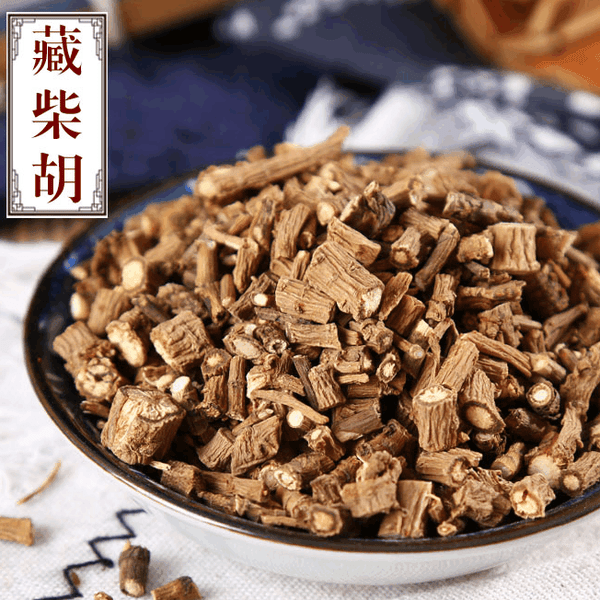Product Overview
Parts used: Dried root and rhizome
TCM category: Cool/Acrid herbs that release the Exterior
TCM nature: Cool
TCM taste(s): Bitter
Meridian affinity: Gall bladder Liver
Scientific name: Bupleurum chinense
Other names: Thorowax
Use of bupleurum roots (Chai Hu) in TCM
Please note that you should never self-prescribe TCM ingredients. A TCM ingredient is almost never eaten on its own but as part of a formula containing several ingredients that act together. Please consult a professional TCM practitionner, they will be best able to guide you.
Preparation: Remove impurities, wash, soak in water, cut in thick slices and dry.
Dosage: 3-10 grams
Main actions according to TCM*: Harmonizes exterior and interior. Smoothes the Liver and upraises the Yang.
Primary conditions or symptoms for which bupleurum roots may be prescribed by TCM doctors*: Common cold Fever Malaria Chest pain Irregular menstruation Uterine prolapse Rectal prolapse
Contraindications*: Not suitable for those whose Liver Qi is already uprising.
Common TCM formulas in which bupleurum roots are used*:
For harmonizing Internal and External symptoms, Cold and Heat, Excess and Deficiency and treating associated symptoms (common cold, influenza, pneumonia, indigestion, nervous exhaustion, etc.) combine bupleurum roots with jujube dates (Da Zao), crow-dipper rhizomes (Ban Xia), white peony roots (Bai Shao), baikal skullcap roots (Huang Qin), ginseng (Ren Shen), cinnamon twigs (Gui Zhi), fresh ginger (Sheng Jiang) and liquorice (Gan Cao).
For menstrual irregularity with depression and moodiness combine bupleurum roots with white peony roots (Bai Shao).
For the treatment of prolapsed Qi with symptoms of chronic fatigue and weakness as a result of physical exertion or stress combine bupleurum roots with codonopsis roots (Dang Shen), atractylodes rhizomes (Bai Shu), milkvetch roots (Huang Qi), ginseng (Ren Shen), liquorice (Gan Cao), dong quai (Dang Gui), bugbane rhizomes (Sheng Ma) and tangerine peel (Chen Pi).
For flank pain or pain beneath the ribs combine bupleurum roots with oyster shells (Mu Li ke), red peony roots (Chi Shao) and red sage roots (Dan Shen).
For Damp-Heat in the Liver and Gallbladder, gallstones and/or jaundice combine bupleurum roots with gold coin herb (Jin Qian Cao), virgate wormwood (Yin Chen) and cape jasmine fruits (Zhi Zi).
For painful distension of the breasts due to Liver Qi stagnation combine bupleurum roots with sponge gourds (Si Gua) and coco-grass rhizomes (Xiang Fu).
Key TCM concepts behind bupleurum roots (Chai Hu)'s properties
In Traditional Chinese Medicine (TCM), bupleurum roots are plants that belong to the 'Cool/Acrid herbs that release the Exterior' category. Herbs that release the Exterior aim to to treat the early stages of diseases that affect the upper respiratory tract, the eyes, the ears, the nose, the throat or the skin. TCM believes that External diseases such as colds or allergies can only invade the body if the External environment overwhelms our Wei Qi (the TCM version of the immune system). In order to counteract this invasion Cool/Acrid herbs aim to induce sweating by dilating our capillary pores so that they release more sweat. The belief is that this will expel the disease from the body and stop it from invading further.
As suggested by its category bupleurum roots are plants that are Cool in nature. This means that bupleurum roots tend to help people who have too much "heat" in their body, although with less effect than a plant that would be Cold in nature. Balance between Yin and Yang is a key health concept in TCM. Those who have too much heat in their body are said to either have a Yang excess (because Yang is Hot in nature) or a Yin deficiency (Yin is Cold in Nature). Depending on your condition bupleurum roots can help restore a harmonious balance between Yin and Yang.
Bupleurum roots also taste Bitter. The so-called "five elements" theory in Chinese Medicine states that the taste of TCM ingredients is a key determinant of their action in the body. Bitter ingredients like bupleurum roots tend to have a cleansing action on the body by clearing heat, drying dampness and promoting elimination via urination or bowel movements.
The tastes of ingredients in TCM also determine what organs and meridians they target. As such bupleurum roots are thought to target the Gallbladder and the Liver. Similar to modern medicine, in TCM the Gall Bladder stores and releases bile produced by the Liver. It also controls the emotion of decisiveness. The Liver on the other hand is often referred as the body's "general" because it is in charge of regulating the movements of Qi and body fluids. It also takes a leading role in balancing our emotions.










